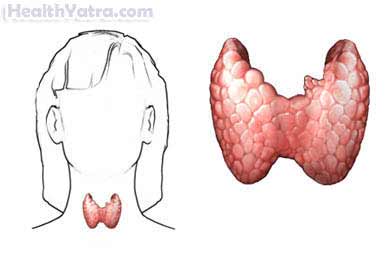Definition
Hyperthyroidism is too much thyroid hormone. It develops when the thyroid gland becomes overactive.
The thyroid gland is a butterfly-shaped gland in the front of the neck. It produces hormones called T3 and T4. They control the body’s metabolism.

Causes
Hyperthyroidism may be caused by:
- Graves’ disease—problem with the immune system
- Thyroid nodules:
- Toxic uninodular goiter—a single area/nodule in the thyroid gland is overactive
- Toxic multinodular goiter—multiple nodules in the thyroid gland which overproduce thyroid hormone
- Thyroiditis—inflammation of the thyroid that may later lead to hypothyroidism
- Taking too much thyroid hormone—very rarely from meat sources contaminated by animal thyroid glands
Risk Factors
These factors increase your chance of developing hyperthyroidism:
- Pregnancy: postpartum thyroiditis (hyperthyroidism followed by hypothyroidism)
- Family history of Graves’ disease
- Certain viral infections
- Smoking
Symptoms
Symptoms come on slowly. They may be mistaken for stress. As the thyroid becomes more overactive, symptoms may include:
- Unexplained weight loss despite an increased appetite
- Heart palpitations
- Increased number of bowel movements/diarrhea
- Restlessness
- Tremors
- Fatigue
- Changes in libido
- Muscle weakness and wasting, especially in the elderly
- Heat intolerance
- Enlarged thyroid gland ( goiter)
- Increased sweating
- Nervousness
- Irritability
- Lumpy, red thickening of the skin in front of the shins
- Shortness of breath
- Irregular or no menstrual periods
- Heart failure or atrial fibrillation, especially in the elderly
Diagnosis
The doctor will ask about your symptoms and medical and family history. A physical exam will be done. The exam often reveals:
- Enlarged thyroid gland, also known as a goiter
- Rapid pulse rate
- Warm, moist skin
- Enlarged red prominent eyes (opthalmopathy)
- Prominent reflexes
- Muscle weakness (arms and legs)
- Rash on front of shins
Your doctor may order the following tests:
- Blood tests —to measure level of thyroid hormones and look for thyroid antibodies
- Radioactive iodine uptake test—measures how active thyroid is in taking up the iodine
Treatment
Treatment will depend on the cause. It will also be adjusted if you are pregnant.
Options include:
Antithyroid Drugs
Antithyroid drugs work best for Graves’ disease. They will reduce thyroid activity. Smoking can interfere with some of the medications. If you smoke, talk to your doctor about how to quit.
All theses medications can cause a rash, fever and painful joints. Serious adverse reactions include lack of infection fighting cells.
If the disease goes into remission, you may no longer need medication.
Beta-Blockers
This type of medication can relieve rapid heart rate and jitters.
Radioactive Iodine
Radioactive iodine is taken orally. It is then absorbed by the thyroid gland. Once there, it damages most of the thyroid cells. These cells can no longer produce thyroid hormones. Within days, the excess iodine passes out of the body in the urine or changes into a nonradioactive state. This treatment reduces the activity of the thyroid. Sometimes the treatment can decrease the thyroid levels too much. In this case, you will need to take a daily thyroid hormone replacement.
Surgery
Surgery is uncommon for the treatment of hyperthyroidism. It will remove part or all of the thyroid. It may be an option when medical therapy fails.
After surgery, you may need to take a daily thyroid supplement.
Eye Protection
If there are eye symptoms like dry red eyes or double vision, your doctor may prescribe:
- Eye protection before sleep
- Artificial tears
- Sunglasses
If you are diagnosed with hyperthyroidism, follow your doctor’s instructions . You may be referred to an eye specialist.
Prevention
There are no specific preventative steps. Get regular screening if you have a family history of hyperthyroidism.
